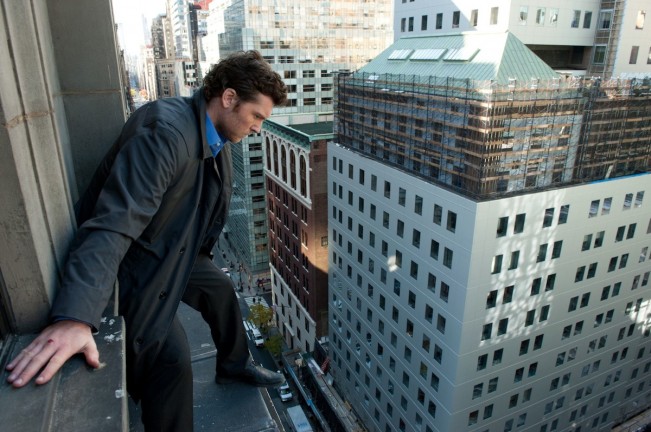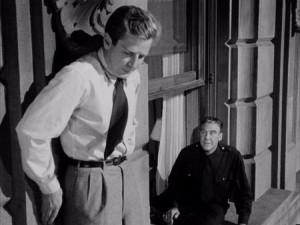

By Mike Wilmington Wilmington@moviecitynews.com
Wilmington on Movies: Man on a Ledge
MAN ON A LEDGE (Two Stars)
U.S.: Asger Leth, 2012
Man on a Ledge, a thriller about a man clinging to a 21st story hotel ledge, while Manhattan goes wild below him, is a real mind-boggler—not because of any hair-raising suspense it generates but because the story is so ridiculous that, despite the movie’s high-octane cast and technical finesse, it’s capable of putting you into a state of befuddled exasperation.
 The picture’s constantly accelerating absurdities, which include a ludicrous heist scene, a egomaniacal TV newswoman exploiting the story, bickering cops and crisis managers fighting and flirting with each other (and with the jumper), and a Donald Trump-like villain sneering aways—suggest the filmmakers assume their audience will swallow anything. I hope not. Man on a Ledge has that slick, self-satisfied gleam movies can get when they cost too much and they’re stuffed with formula and clichés and stars, and nobody can do anything about it. It also has a plot so preposterous, motivations so inane, and an ending so bonkers that the only possible way to play them may be for laughs, if the show were good at comedy (which it isn’t.)
The picture’s constantly accelerating absurdities, which include a ludicrous heist scene, a egomaniacal TV newswoman exploiting the story, bickering cops and crisis managers fighting and flirting with each other (and with the jumper), and a Donald Trump-like villain sneering aways—suggest the filmmakers assume their audience will swallow anything. I hope not. Man on a Ledge has that slick, self-satisfied gleam movies can get when they cost too much and they’re stuffed with formula and clichés and stars, and nobody can do anything about it. It also has a plot so preposterous, motivations so inane, and an ending so bonkers that the only possible way to play them may be for laughs, if the show were good at comedy (which it isn’t.)
Consider the premise. A tough ex-cop named Nick Cassidy (played by Avatar‘s Sam Worthington), who’s in jail, framed for a $40 million diamond robbery from that Trump-like financier David Englander (Ed Harris)—escapes from custody while on a furlough to attend his father’s funeral. Then he checks into the Roosevelt Hotel, orders a room service breakfast and crawls out the window and out on the ledge, 21 stories above the streets. Soon, he attracts a crowd, as well as police (his buddy Mike played by Anthony Mackie and the cynical Jack Dougherty (Edward Burns), along with a vain, callous TV news reporter Suzie Morales (Kyra Sedgwick), and a lusty but conscientious crisis negotiator, Lydia Mercer (Elizabeth Banks), who tries a little harder than cynical Jack to talk Nick back inside.
It doesn’t work. Nick keeps refusing to get off his ledge while talking in a curious accent that suggests an Australian trying to impersonate a New York City Irish-American. (Couldn’t Worthington get some lessons from Burns?)
Why, you may wonder, does somebody break out of prison in order to jump out of a hotel window? Good question. (There are many more.) It turns out that the episode we’re watching is not a real suicide attempt at all, but an elaborate diversion, intended to preoccupy the police and everyone else, while, across the street, Nick’s live-wire brother Joey (Jamie Bell) and Joey’s hottie partner Angie (Genesis Rodriguez) break into Englander’s suite, where they’re convinced the 40 million dollar diamond is still lying around somewhere—and will exonerate Nick, if they find it. In other words, the “jump” is a phony staged as part of a robbery intended to clear the “jumper” of a conviction for another robbery of the very same diamond. Got that?
This outrageously silly heist, which Nick helps direct by cell-phone while standing on that ledge, seems twice as nutty as the one Eddie Murphy was trying to pull in Tower Heist, though that movie did have higher windows and the Macy‘s Parade as an added diversion (and no ledges). The diamond robbery in Ledge is a heist that might have been choreographed by Bob Fosse on a bad day. With Joey behind her, Angie—dressed in an outfit better suited for lap-dancing than for breaking and entering—slithers down vents and avoids alarms to try to locate the diamond.
Why this robbery is committed during the day, after a huge crowd and lots of police and media have been pulled into the area by the phony suicide, or why Nick didn’t do his ledge routine somewhere else further away, remains another of the show’s endless mysteries. Nor is it ever explained, at least while I was paying attention, why nobody seems to notice or wonder about Nick’s cell-phone calls to Joey, while he‘s supposedly dancing around on the edge of the ledge, contemplating suicide.
Meanwhile, there’s sexual tension between Burns and Banks, sexual tension between Banks and Worthington, sexual tension between Bell and Rodriguez and sexual tension between Sedgwick and herself and between Harris and himself (just like Trump).
SPOILER ALERT
And when Nick finally does jump, in order to get to the street faster and chase Englander, it’s the most outrageous moment in a film that has all too many.
END OF SPOILER
 In the early 50s, Howard Hawks was offered the script of Fourteen Hours, another movie about a man on a ledge: an actual neurotic jumper played by Richard Basehart—and the ledge guy was talked down in that movie by fatherly Paul Douglas. (Newcomers Grace Kelly and Jeff Hunter were in the crowd below.) Hawks refused the project, saying that the only way he could make a movie out of an idea like that would be to turn it into a Cary Grant comedy, with Cary as a philanderer who crawls out on the ledge to dodge his lover’s suddenly returning husband, and then, when he‘s discovered, pretends to be a would-be suicide.
In the early 50s, Howard Hawks was offered the script of Fourteen Hours, another movie about a man on a ledge: an actual neurotic jumper played by Richard Basehart—and the ledge guy was talked down in that movie by fatherly Paul Douglas. (Newcomers Grace Kelly and Jeff Hunter were in the crowd below.) Hawks refused the project, saying that the only way he could make a movie out of an idea like that would be to turn it into a Cary Grant comedy, with Cary as a philanderer who crawls out on the ledge to dodge his lover’s suddenly returning husband, and then, when he‘s discovered, pretends to be a would-be suicide.
I don’t know if that idea would have worked, though you should probably never bet against Cary Grant and Howard Hawks, especially if they got, say, Ben Hecht to write the script. But Hawks’ brief description is more entertaining, and even more believable, than anything that happens in Man on a Ledge. So is the movie that Henry Hathaway made out of Fourteen Hours.
Man on a Ledge is director Asger Leth’s first fiction feature—he’s done an admired documentary called Ghosts of Cité Soleil—and he makes the movie slick and fast. It may be ludicrous, but it’s never actually boring, and the sheer uninspired phoniness and preposterousness of it all almost commands a perverse respect—though to tell the truth, I couldn’t wait to leave.
Still, it’s doubtful that even Howard Hawks, or Steven Spielberg, or Orson Welles, could have done anything with Pablo F. Fenjves’ script, except bury it and start over. Fenjves has a number of feature credits, but his most interesting authorial endeavor is probably his ghost-writing of his one-time neighbor O.J. Simpson’s book, “If I Did It.” Did that experience predispose him in any way to writing about a hotel ledge ’jumper” who commits a robbery to exonerate himself from committing a robbery? Who can tell?













